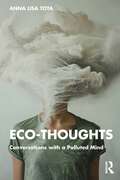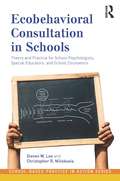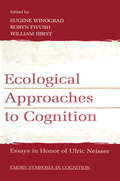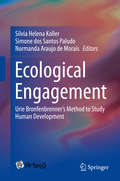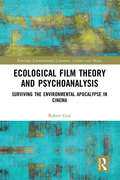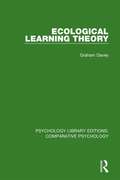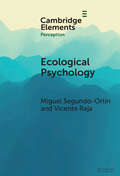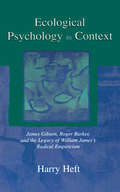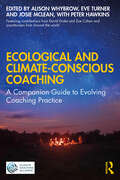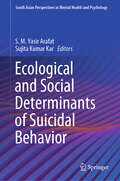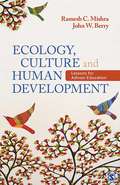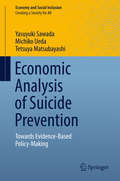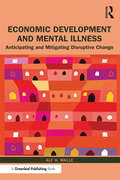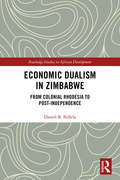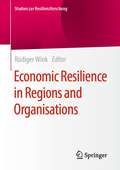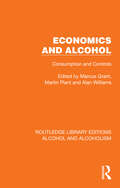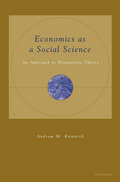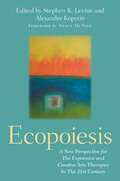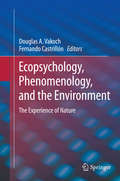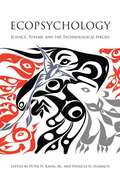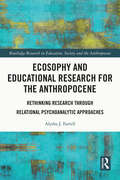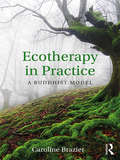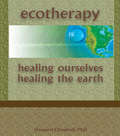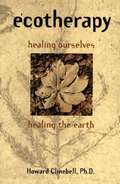- Table View
- List View
Eco-Thoughts: Conversations with a Polluted Mind
by Anna Lisa TotaWhat if the pollution of the world did not only concern the environment in which we live, but also the flow of our thoughts in every moment of everyday life? What if those thoughts, invasive like locusts, could transform and become "eco-thoughts" that make us and others feel good? Ecology concerns us from the inside, passes through us, and literally shapes us: "what is inside is outside". This book offers "eco-words" and "eco-thoughts" as it sheds light on the traps that our minds construct for ourselves, that we so often fall into whether we mean to or not. It examines the erroneous paths that we sometimes meander down while we are thinking in our everyday lives in order to help us to identify and avoid them.The thoughts we formulate are not really ours, as if our mind prefers to flow in what has already been thought, lived, and felt. The author offers her reflections and insights to those who wish to direct their minds towards streams of thought that really do belong to us, that make us feel good. In order to do this, we must learn how to disable the “traps” and free ourselves of what is “contaminating” before they take hold and harm us.An original and thought-provoking examination of how are own internal lives can become toxic, and how to prevent this, that will be of particular value to students and scholars of sociology, philosophy, communication studies, memory studies, and social psychology.
Ecobehavioral Consultation in Schools: Theory and Practice for School Psychologists, Special Educators, and School Counselors (School-Based Practice in Action)
by Steven W. Lee Christopher R. NiilekselaEcobehavioral Consultation in Schools is a practical, theory-based text that advances the practice of ecobehavioral consultation (EBC) and teaches consultants how to develop their own successful practice. It includes examples of what the consultant could say at each step of the process, over 30 easy-to-use forms, and more than 60 interventions available for download on the book’s website. In addition, the explication of EBC theory helps the reader to better understand the "big picture" of each problem, going well beyond a strict behavioral approach to understand family, social, cultural, historical, and internal influences. Ecobehavioral Consultation in Schools is the perfect companion for students in consultation-training programs such as special education, school psychology, school counseling, school social work, or for any other school professional interested in working collaboratively with teachers and parents.
Ecological Approaches to Cognition: Essays in Honor of Ulric Neisser
by Robyn Fivush Eugene Winograd William HirstIn the context of an Emory Symposium on Cognition honoring the enormous contributions to cognitive psychology of Ulric Neisser, this book brings together ecological approaches to various aspects of cognition and its development. Well-known former students and colleagues of Neisser articulate their views on perception, memory, and culture. There is a strong developmental component, with chapters on infant perception, infant problem solving, and the cognitive profile of Williams Syndrome, as well as two chapters that consider philosophical issues related to cognitive psychology.
Ecological Engagement: Urie Bronfenbrenner’s Method to Study Human Development
by Silvia Helena Koller Simone dos Santos Paludo Normanda Araujo de MoraisThis book presents the method developed by Dr. Silvia Helena Koller and her students and collaborators to apply Urie Bronfenbrenner’s Bioecological Theory of Human Development to empirical studies with children and adolescents. Although Bronfenbrenner's theory, in different stages of development, has been widely cited by several researchers, surprisingly little has been written about the theory itself, its evolution or about the methods that should be used to test it. This book fills this gap by presenting both an overview of Bronfenbrenner’s theory and a method to apply it to empirical research, the Ecological Engagement method.The book also shows how this method can be applied in practice by bringing together a series of research reports of studies carried out in different regions of Brazil and in Angola that used the Ecological Engagement method to study children and adolescent development in different contexts, such as street situation, sexual exploitation, institutional reception, family reintegration, school and emergency and disasters, among others.Ecological Engagement – Urie Bronfenbrenner’s Method to Study Human Development will be a valuable tool for psychologists and other social scientists interested in child and adolescent development looking for a solid an innovative methodology that allows researchers to directly interact with their research subjects in their own social contexts in order to fully understand their problems and issues. “The methodology of Ecological Engagement, that is explained and richly empirically illustrated in this book, is a singularly significant extension of [Urie Bronfenbrenner’s] bioecological model. Indeed, in my view it is a brilliant empirical instantiation of the PPCT component of the model. (…) Ecological Engagement methodology is the scientific means through which Urie’s legacy can be furthered.” – Excerpt from the Foreword to the International Edition by Dr. Richard M. Lerner, director of the Institute for Applied Research in Youth Development, Tufts University
Ecological Film Theory and Psychoanalysis: Surviving the Environmental Apocalypse in Cinema (Routledge Environmental Literature, Culture and Media)
by Robert GealThis book applies ecolinguistics and psychoanalysis to explore how films fictionalising environmental disasters provide spectacular warnings against the dangers of environmental apocalypse, while highlighting that even these apparently environmentally friendly films can still facilitate problematic real-world changes in how people treat the environment. Ecological Film Theory and Psychoanalysis argues that these films exploit cinema’s inherent Cartesian grammar to construct texts in which not only small groups of protagonist survivors, but also vicarious spectators, pleasurably transcend the fictionalised destruction. The ideological nature of the ‘lifeboats’ on which these survivors escape, moreover, is accompanied by additional elements that constitute contemporary Cartesian subjectivity, such as class and gender binaries, restored nuclear families, individual as opposed to social responsibilities for disasters, and so on. The book conducts extensive analyses of these processes, before considering alternative forms of filmmaking that might avoid the dangers of this existing form of storytelling. The book’s new ecosophy and film theory establishes that Cartesian subjectivity is an environmentally destructive ‘symptom’ that everyday linguistic activities like watching films reinforce. This book will be of great interest to students and scholars of film studies, literary studies (specifically ecocriticism), cultural studies, ecolinguistics, and ecosophy.
Ecological Learning Theory (Psychology Library Editions: Comparative Psychology)
by Graham DaveyOriginally published in 1989, this title presents a view of adaptive behaviour which integrates both evolutionary and psychological perspectives on learning. The study of learning, and in particular conditioning, had evolved in isolation from the rest of the biological sciences, and until the late 1980s had largely ignored the fact that learning processes are adaptive functions subject to the pressures of evolutionary selection. This text is designed to give a thorough insight into contemporary views of learning mechanisms, at the same time incorporating an evolutionary perspective on the function and performance of learning. Graham Davey gives a detailed introduction to evolutionary approaches to behaviour and basic learning phenomena such as Pavlovian and instrumental conditioning. He also provides a comparative introduction to both learning and performance aspects of conditioning. He covers ecological approaches to adaptive behaviour (e.g. foraging theory), specialized learning processes such as concept formation, spatial learning, and language learning. Innovative in its integration of ecological and evolutionary approaches with more traditional associative views of learning, the book introduces the reader to learning in a very wide variety of species other than the traditional laboratory rat and pigeon. It will be valuable to anyone with a general interest in animal behaviour, and also to those with a specific interest in learning, adaptive behaviour, and evolutionary approaches to behaviour.
Ecological Psychology (Elements in Perception)
by Miguel Segundo-Ortin Vicente RajaEcological psychology is one of the main alternative theories of perception and action available in the contemporary literature. This Element explores and analyzes its most relevant ideas, concepts, methods, and experimental results. It discusses the historical roots of the ecological approach. The Element then analyzes the works of the two main founders of ecological psychology: James and Eleanor Gibson. It also explores the development of ecological psychology since the 1980s until nowadays. Finally, the Element identifies and evaluates the future of the ecological approach to perception and action.
Ecological Psychology in Context: James Gibson, Roger Barker, and the Legacy of William James's Radical Empiricism (Resources for Ecological Psychology Series)
by Harry HeftIn this book Harry Heft examines the historical and theoretical foundations of James J. Gibson's ecological psychology in 20th century thought, and in turn, integrates ecological psychology and analyses of sociocultural processes. A thesis of the book is that knowing is rooted in the direct experience of meaningful environmental objects and events present in individual-environment processes and at the level of collective, social settings. Ecological Psychology in Context: *traces the primary lineage of Gibson's ecological approach to William James's philosophy of radical empiricism; *illuminates how the work of James's student and Gibson's mentor, E.B. Holt, served as a catalyst for the development of Gibson's framework and as a bridge to James's work; *reveals how ecological psychology reciprocally can advance Jamesian studies by resolving some of the theoretical difficulties that kept James from fully realizing a realist philosophy; *broadens the scope of Gibson's framework by proposing a synthesis between it and the ecological program of Roger Barker, who discovered complex systems operating at the level of collective, social processes; *demonstrates ways in which the psychological domain can be extended to properties of the environment rendering its features meaningful, publicly accessible, and distributed across person-environment processes; and *shows how Gibson's work points the way toward overcoming the gap between experimental psychology and the humanities. Intended for scholars and students in the areas of ecological and environmental psychology, theoretical and historical psychology, cognitive science, developmental psychology, anthropology, and philosophy.
Ecological and Climate-Conscious Coaching: A Companion Guide to Evolving Coaching Practice
by Peter Hawkins Alison Whybrow Eve Turner Josie McLeanThis book takes you on a seven-day journey with your guides: 60 coaches and thought-leaders from around the world. Through storytelling, poetry and other creative approaches, readers can follow this programme alone or with others and take a practical and empowering look at the impact of the climate emergency on their practice and how they might respond. Ecological and Climate-Conscious Coaching: a Companion Guide to Evolving Coaching Practice describes methods for adapting your practice while making a livelihood, reframing your work with urgency and action through exploration of the five-stage ‘Eco-phase’ cycle, moving from ‘Eco Curious’, ‘Eco-Informed’, ‘Eco-Aware’, to ‘Eco-Engaged’ and ‘Eco Active’. Designed to encourage discussion, raise awareness and increase confidence about stepping into a leadership role, the book explores the difference that coaching can make in the world as a result of greater eco-awareness and systemic understanding. Featuring powerful stories from around the world, and with a treasure trove of resources and practical tools and methods, supported by reflective and practical exercises, this book will be an inspiring read not only for those involved in coaching, supervision, mentoring and leadership development, but also for leaders.
Ecological and Social Determinants of Suicidal Behavior (South Asian Perspectives in Mental Health and Psychology)
by S. M. Yasir Arafat Sujita Kumar KarThis book discusses the association between ecological and social determinants and suicidal behavior. Suicidal behavior is an extremely complex human behavior. It is an outcome of complex interactions among multiple factors like gene and environment, biopsychosocial, proximal and distal factors. Several risk factors such as psychiatric disorders, life events, social deprivation, personality traits and disorders, and substance abuse have been identified even though those vary based on culture, time, country, and methods of assessment. In recent times, evidence has shown associations among ecological variables like the human development index, the income of the country, the GINI index, educational attainment, the green environment, climate change, and suicidal behavior. At the same time, there are interlinked confounding variables that challenge the findings. Given the lack of literature discussing these findings, this book seeks to compare and contrast the ecological aspects and suicidal behavior holistically.
Ecology, Culture and Human Development: Lessons for Adivasi Education
by John W. Berry Ramesh Chandra MishraThe key to the upliftment of the Adivasi community is a deep understanding of their culture, psychological resources and cognitive strengths. Ecology, Culture and Human Development: Lessons for Adivasi Education presents a comparative analysis of the cultural and cognitive dimensions of various communities in Canada, Ghana, China and India, and seeks answers from this analysis for Adivasi education. It debunks the myths of low intelligence and inferior cognitive capacity of the Adivasi community, and emphasizes the remarkable performance of Adivasi children when assessed in terms of their ecological and cultural contexts. Extensively illustrated and containing substantive data on all relevant aspects of human development, this book is a much-desired addition to the literature on this crucial aspect of social development in India. It is a comprehensive resource that aims to contribute substantially towards mitigating the travails of the Adivasi community and ensuring their social empowerment.
Economic Analysis of Suicide Prevention: Towards Evidence-based Policy-making (Economy And Social Inclusion Ser.)
by Yasuyuki Sawada Michiko Ueda Tetsuya MatsubayashiThis book examines the causes and consequences of suicide from the perspective of economics. The approach here differs from those in medical, psychiatric, epidemiological, and sociological studies of suicide and is thus novel in a way that highlights the importance of economic and institutional settings in the problem of suicide. The authors argue that suicide imposes a tremendous economic cost on contemporary society in a variety of ways, requiring the government to develop an effective prevention strategy. An empirical analysis using data from Japan and other developed countries shows that natural disasters and economic crises increase suicide rates, while liberal government policies favorable to the poor can decrease them. Further, the types of effective prevention strategies in the context of railway/subway suicides, celebrity suicides, public awareness campaigns, and education using data primarily from Japan are revealed. This book ultimately contributes to an understanding of suicides and the development of evidence-based policy proposals. The Japanese version of this book won the 56th Nikkei Prize for Economics Books (Nikkei Keizai Tosho Bunka Award) in 2013.
Economic Development and Mental Illness: Anticipating and Mitigating Disruptive Change
by Alf H. WalleSocial, economic, and technological changes disrupt many Indigenous, ethnic, and rural communities even when offering progress. Under these conditions, social and psychological dysfunctions are likely to emerge. This book provides insights regarding how to anticipate, prevent, and, when necessary, provide mitigation strategies to communities and individuals who suffer as a result. This book, the first of its kind, provides an overview of strategic and policy issues involving the relationship between change and dysfunction, enabling the reader to more effectively deal with potentially hurtful influences in proactive, equitable, and culturally sensitive ways. After providing a theoretical overview, methods for anticipating the hurtful impacts of change are discussed, along with techniques for mitigating its negative effects upon communities and individuals. Learning objectives and discussion questions are included with each chapter, and the book can serve as a text for courses on indigenous economic development, Native studies, culturally appropriate business, and culturally competent therapy. It can also be used as a professional handbook for practitioners working with communities affected by these issues.
Economic Dualism in Zimbabwe: From Colonial Rhodesia to Post-Independence (Routledge Studies in African Development)
by Daniel B. NdlelaThis book identifies the root causes of income inequality in underdeveloped economies and proposes new solutions for structural reform in economies that have long neglected and exploited working people. It focuses on the case of Zimbabwe, a classic example of an African post-colonial state continuing with dualistic economic structures while simultaneously laying the blame for the initiation of this form of underdevelopment with colonialism. The book explores the colonial roots of economic dualism, in which traditional sectors run alongside newer forms of wage employment, and suggests ways for Zimbabwe to move beyond the ingrained inequalities and asymmetries in production and organisation that it generates. Using a combination of theoretical and empirical approaches, Economic Dualism in Zimbabwe demonstrates how economic dualism can be eliminated through structural transformation of the traditional agricultural sector and reallocation of labour across sectors. The author comprehensively discusses the origins of dualism in Zimbabwe, how it developed in land, labour, credit and financial markets, who stands to gain and lose from it, and ultimately what reforms are needed to eliminate dualism from the economic system. The book aims to complement efforts made by both North and South to transform this structurally embedded cause of underdevelopment and seeks to motivate change in the collective development agenda mindset. This book will be of interest to graduate-level students, scholars, researchers and policy practitioners in the fields of Development Studies, Economics, Agricultural Policy, Labour Policy, Economic Planning and African Studies.
Economic Resilience in Regions and Organisations (Studien zur Resilienzforschung)
by Rüdiger WinkLeading researchers on economic resilience from economic geography, economic history and organizational studies discuss recent approaches to better understand the impact of structures, processes, agency, governance and multilevel settings on economic resilience.
Economics and Alcohol: Consumption and Controls (Routledge Library Editions: Alcohol and Alcoholism)
by Alan Williams Martin Plant Marcus GrantDuring the 1950s, 1960s and 1970s, general levels of alcohol consumption had risen considerably in all parts of the world. In association with this, there was a proliferation of alcohol-related problems such as liver disease, drunkenness offences, marital disharmony and employment difficulties. Many factors influence the probability of alcohol addiction and the habits of drinking; they include age, sex, race, occupation and income. Economic aspects of the use and misuse of alcohol had been attracting increasing attention during the early 1980s. Politicians and scholars alike had drawn attention to the benefits of a vigorous alcohol industry on the one hand, and on the other, the costs of providing medical, social and educational services for those suffering from alcohol-related problems. Originally published in 1983, the real nature of the relationship between economics and alcohol is explored in detail for the first time in this book. It argues for increased participation by economists in the processes of social policy decision-making and considers the key issues of cost-benefit analyses, control policies, taxation and programme efficiency. No easy solutions are provided, but a host of unjustified assumptions about this subject are clarified. This book paved the way for substantial future collaboration between economists and those involved in alcohol studies.
Economics as a Social Science
by Andrew M. KamarckEconomics as a Social Scienceis a highly readable critique of economic theory, based on a wide range of research, that endeavors to restore economics to its proper role as a social science. Contrary to conventional economic theory, which assumes that people have no free will, this book instead bases economics on the realistic assumption that human beings can choose; that we are complex beings affected by emotion, custom, habit, and reason; and that our behavior varies with circumstances and times. It embraces the findings of history, psychology, and other social sciences and the insights from great literature on human behavior as opposed to the rigidity set by mathematical axioms that define how economics is understood and practiced today. Andrew M. Kamarck demonstrates that only rough accuracy is attainable in economic measurement, and that understanding an economy requires knowledge from other disciplines. The canonical hypotheses of economics (perfect rationality, self-interest, equilibrium) are shown to be inadequate (and in the case of "equilibrium" to be counterproductive to understanding the forces that dominate the economy), and more satisfactory assumptions provided. The market is shown to work imperfectly and to require appropriate institutions to perform its function reasonably well. Further, Kamarck argues that self-interest does not always lead to helping the general interest. Economics as a Social Scienceexamines and revises the fundamental assumptions of economics. Because it avoids jargon and explains terms carefully, it will be of interest to economics majors as well as to graduate students of economics and other social sciences, and social scientists working in government and the private sector. Andrew M. Kamarck is former Director, Economic Development Institute, the World Bank.
Ecopoiesis: A New Perspective for The Expressive and Creative Arts Therapies In The 21st Century
by Stephen K. Levine and Alexander KopytinThis book emphasises ecological, nature-assisted expressive and creative arts and art therapies within the context of the current ecological crises. Rich in fresh theoretical perspectives, this timely compendium of theory, research, and practice also provides methods and tools that can help the reader understand and incorporate new eco perspectives into their work.Building on the concept of poiesis as the human creative function, this book seeks to stress the importance of humanity's ecopoietic capacity, creating a more sustainable life for humans. It has been specifically created within the context of this most critical period of human existence, and acts as a forum for innovation based on the values of the environmental movement and its desire to address the extensive sociopsychological impact of the ecological crisis.
Ecopsychology, Phenomenology, and the Environment
by Douglas A. Vakoch Fernando CastrillónThis book seeks to confront an apparent contradiction: that while we are constantly attending to environmental issues, we seem to be woefully out of touch with nature. The goal of Ecopsychology, Phenomenology and the Environment is to foster an enhanced awareness of nature that can lead us to new ways of relating to the environment, ultimately yielding more sustainable patterns of living. This volume is different from other books in the rapidly growing field of ecopsychology in its emphasis on phenomenological approaches, building on the work of phenomenological psychologists such as Maurice Merleau-Ponty. This focus on phenomenological methodologies for articulating our direct experience of nature serves as a critical complement to the usual methodologies of environmental and conservation psychologists, who have emphasized quantitative research. Moreover, Ecopsychology, Phenomenology and the Environment is distinctive insofar as chapters by phenomenologically-sophisticated ecopsychologists are complemented by chapters written by phenomenological researchers of environmental issues with backgrounds in philosophy and geology, providing a breadth and depth of perspective not found in other works written exclusively by psychologists.
Ecopsychology: Restoring the Earth, Healing the Mind
by Theodore Roszak Mary E. Gomes Allen D. Kanner"A breakthrough book. It makes crystal clear that the natural world is not just an `environment' around us, but it is us, existing inside our souls and minds."--Jerry Mander "A very exciting book of enormous interest for everyone concerned with the future of our species--environmentalists and legislators, industrialists and educators, you and me. Its message should become part of Western thought."--Jane Goodall --This text refers to the Paperback edition.
Ecopsychology: Science, Totems, and the Technological Species
by Patricia H. Hasbach Peter H. Kahn Jr.We need nature for our physical and psychological well-being. Our actions reflect this when we turn to beloved pets for companionship, vacation in spots of natural splendor, or spend hours working in the garden. Yet we are also a technological species and have been since we fashioned tools out of stone. Thus one of this century's central challenges is to embrace our kinship with a more-than-human world--"our totemic self"--and integrate that kinship with our scientific culture and technological selves. This book takes on that challenge and proposes a reenvisioned ecopsychology. Contributors consider such topics as the innate tendency for people to bond with local place; a meaningful nature language; the epidemiological evidence for the health benefits of nature interaction; the theory and practice of ecotherapy; Gaia theory; ecovillages; the neuroscience of perceiving natural beauty; and sacred geography. Taken together, the essays offer a vision for human flourishing and for a more grounded and realistic environmental psychology.
Ecosophy and Educational Research for the Anthropocene: Rethinking Research through Relational Psychoanalytic Approaches (Routledge Research in Education, Society and the Anthropocene)
by Alysha J. FarrellProblematizing the aims of education in the Anthropocene, this text illustrates the value of relational psychoanalytic theory in the study and practice of education amidst the climate crisis. Illustrating how dominant educational theory fails to acknowledge climate precarity and the consequences of living beyond the Earth’s carrying capacity, Ecosophy and Educational Research for the Anthropocene calls for a reorientation of scholarship to decentre the human subject. The author discusses the evolution of intersubjective psychoanalysis to make a case for a turn to relational and psychoanalytically informed educational research. Chapters foreground areas for educational researchers to consider in pursuing intersubjective inquiries into the affective dimensions of curriculum and pedagogy to foster an emergence of eco-attunement and ecosophical educational research (EER). By framing an ecosophical approach, this book enables educational leaders, researchers and educators to fulfil their responsibility to engage in educational praxis which is contextually responsive, relationally attuned and recognizant that we cannot be studied apart from our connections to the planet.
Ecotherapy in Practice: A Buddhist Model
by Caroline BrazierEcotherapy in Practice reflects the growing interest and research in this field. Drawing on a diversity of experience from the counselling and psychotherapy professions, but also from practitioners in community work, mental health and education, this book explores the exciting and innovative possibilities involved in practising outdoors. Caroline Brazier brings to bear her experience and knowledge as a psychotherapist, group worker and trainer over several decades to think about therapeutic work outdoors in all its forms. The book presents a model of ecotherapy based on principles drawn from Buddhist psychology and Western psychotherapy which focuses particularly on the relationship between person and environment at three levels, moving from the personal level of individual history to cultural influences, then finally to global circumstances, all of which condition mind-states and psychological wellbeing. Ecotherapy in Practice will provide refreshing and valuable reading for psychotherapists and counsellors in the field, those interested in Buddhism, and other mental health and health professionals working outdoors
Ecotherapy: Healing Ourselves, Healing the Earth
by Howard ClinebellHere is a trailblazing book on issues of vital interest to the future of humankind. Ecotherapy: Healing Ourselves, Healing the Earth sheds light on humankind’s most serious health challenge ever--how to save our precious planet as a clean, viable habitat. As a guide for therapists, health professionals, pastoral counselors, teachers, medical healers, and especially parents, Ecotherapy: Healing Ourselves, Healing the Earth highlights readers’strategic opportunities to help our endangered human species cope constructively with the unprecedented challenge of saving a healthful planet for future generations.Ecotherapy: Healing Ourselves, Healing the Earth introduces readers to an innovative approach to ecologically-grounded personality theory, spirituality, ecotherapy, and education. The book shares the author’s well-developed theories and methods of ecological diagnosis, treatment, and education so professionals and parents, our most influential teachers, can rise to the challenge of saving our planet. Readers will find that the book helps them accomplish this goal as it: explores an expanded, ecologically grounded theory of personality development, the missing dimension in understanding human identity formation outlines a model for doing ecologically oriented psychotherapy, counseling, medical healing, teaching, and parenting describes life-saving perspectives for making one’s lifestyle more earth-caring demonstrates the importance of hope, humor, and love suggests how these earthy approaches may be utilized in a variety of social contexts and cultures A systematic theory and practice guidebook, Ecotherapy: Healing Ourselves, Healing the Earth fills a wide gap in both the counseling and therapy literature and the ecology literature. It offers an innovative model for fulfilling the “ecological circle” between humans and nature with three action dimensions. These are self-care by being intentionally nurtured by nature; spiritual enrichment by enjoying the transcendent Spirit in nature; and responding by nurturing nature more responsibly and lovingly.The theories and practical applications presented in the book come together to explore long-overlooked issues at the boundary between human health and the health of the natural environment. Psychotherapists, health professionals, and teachers; pastoral counselors and other clergy who counsel and teach; laypersons who are parents and grandparents; and individuals and groups interested in environmental issues will find Ecotherapy: Healing Ourselves, Healing the Earth essential for approaching the long-neglected earthy roots of the total human mind-body-spirit organism.
Ecotherapy: Healing Ourselves, Healing the Earth
by Robert AndersonHere is a trailblazing book on issues of vital interest to the future of humankind. Ecotherapy: Healing Ourselves, Healing the Earth sheds light on humankind’s most serious health challenge ever--how to save our precious planet as a clean, viable habitat. As a guide for therapists, health professionals, pastoral counselors, teachers, medical healers, and especially parents, Ecotherapy: Healing Ourselves, Healing the Earth highlights readers’strategic opportunities to help our endangered human species cope constructively with the unprecedented challenge of saving a healthful planet for future generations. <p><p> Ecotherapy: Healing Ourselves, Healing the Earth introduces readers to an innovative approach to ecologically-grounded personality theory, spirituality, ecotherapy, and education. The book shares the author’s well-developed theories and methods of ecological diagnosis, treatment, and education so professionals and parents, our most influential teachers, can rise to the challenge of saving our planet. <p> A systematic theory and practice guidebook, Ecotherapy: Healing Ourselves, Healing the Earth fills a wide gap in both the counseling and therapy literature and the ecology literature. It offers an innovative model for fulfilling the “ecological circle” between humans and nature with three action dimensions. These are self-care by being intentionally nurtured by nature; spiritual enrichment by enjoying the transcendent Spirit in nature; and responding by nurturing nature more responsibly and lovingly. <p> The theories and practical applications presented in the book come together to explore long-overlooked issues at the boundary between human health and the health of the natural environment. Psychotherapists, health professionals, and teachers; pastoral counselors and other clergy who counsel and teach; laypersons who are parents and grandparents; and individuals and groups interested in environmental issues will find Ecotherapy: Healing Ourselves, Healing the Earth essential for approaching the long-neglected earthy roots of the total human mind-body-spirit organism.
